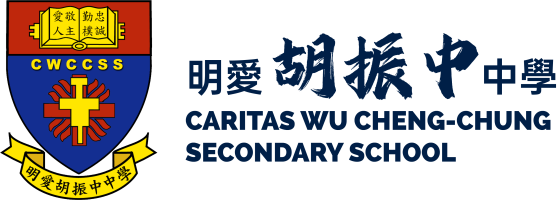| Language Policy |
The students of Caritas Wu Cheng-chung Secondary School come from over 20 different countries and regions. Chinese is the medium of instruction for junior forms. In order to cope with students’ different needs and abilities, non-Chinese speaking students learn all non-language subjects in English. All subjects other than language subjects in senior forms are taught in both Chinese and English classes. Over 15% of the teaching staff are individuals of different nationalities, creating a multicultural environment both inside and outside the classroom. |
| Learning and Teaching Strategies |
Our school closely follows the new senior secondary curriculum. Teachers appropriately change the contents of the subject syllabuses, the teaching methods, students' assignments, and the assessment criteria. The school continuously develops the contents of Liberal Studies and attempts to strengthen the essential learning abilities of junior students. Diverse other learning experiences are provided to further enhance students' quality of life. In the junior level, the school follows the Territory Wide System Assessment criteria whereas the senior levels follow the SBA assessment trend in the NSS. We grouped the existing subjects into seven Key Learning Areas. In the formal curriculum, we conduct courses in performing arts to develop students' multiple intelligence. |
| School-based curriculum |
1. Electives: 2X and 3X. Senior secondary students can, from a vast array of key learning areas and applied learning courses, opt for two to three electives according to their interest and aptitude.<br> 2. Curriculum highlights: <br> (1) Bilingual teaching <br> (2) School-based Entrepreneurship Curriculum<br> (3) UK IGCSE and GCE A Level courses<br> (4) German Language Course (Junior Form) |
| Approach to Catering for Learner Diversity |
To cater for diverse individual learner differences, needs and interests, small-class teaching is practiced with tailor-made courses of study for each group. With abundant opportunities for cooperative learning and project learning, students are expected to develop a culture of appreciation and cooperation. After-school enhancement programmes and remedial tutorials are provided to help our students progress academically. |
| Approach to Integrated Education |
Student Caring Committee was established to create an inclusive learning environment to support students with diverse learning needs. School and parents develop plans for the students together for an optimum support. Various supports such as teaching adaptation, special examination arrangements (in-school and public examination), speech therapy services, remedial learning group, social skills training group and individual educational plans (IEP) would be arranged upon certain assessments. |
| Education Support for Non-Chinese Speaking (NCS) Students |
|
| Home-School Co-operation |
The Parent-Teacher Association was set-up to: <br>- enhance parents' understanding of the school and strengthen communication.<br>- enhance education for parents and foster the communication between parents and children.<br>- encourage and provide opportunities for parents to interact and share their experiences with one another so as to build up a supporting system among them. |
| School Ethos |
Our school has established a harmonious environment of care and love. Students are polite, considerate, self-disciplined and they support one another. We strive to nurture our students in physical fitness, self-discipline, responsibility, independent thinking, creativity, leadership and social skills. Various life education programmes on nurturing positive attitudes and values in students are implemented through the morning assemblies, hall assemblies and class-teacher periods. |
| School Development Plan |
- Further enhancing the effectiveness of learning and teaching.<br>- Cultivating in students positive values and attitudes through spiritual, moral and civic education. <br>- Enhancing school effectiveness through self-evaluation.<br>- Enhancing life education.<br>- Developing student's skills in athletic and performing arts.<br>- Further enhancing technological education and STEAM. Cooperate with the technology companies at CyberPort to create experiential learning opportunities for our students.<br>- Embracing cultural diversity. Through holding variety of activities, Non-Chinese speaking students can enhance their cultural confidence.<br>- Nurturing students' future skills, ready for the future world. |
| Teacher Professional Training and Development |
Whole school approach to promote teachers' professional development: Facilitate co-teaching and collaboration in lesson preparation to further enhance teaching effectiveness in English/Chinese/Mathematics. |
| Life-wide Learning |
To further develop the diverse interests and potential of students, our school has organized various co-curricular activities for them, including: Basketball Team, Badminton Team, Table Tennis Team, Kabaddi Team, Rugby Team, Football Team, Athletics Team, Dance, Choir, English Drama Club, Verse Speaking Club, Astronomy Club, Chinese Club, English Club, Mathematics Club, Science Club, Music Club, Visual Art Club, Hand in Hand Group, Spartans, Student Union, Religion Club, Civic Education Ambassadors, Student Librarians, Caring Ambassadors. |
